Issue at Hand: While U.S. leadership enjoys relatively high approval ratings in Africa, Democrats have signaled that Barack Obama will place a greater emphasis on Africa than his predecessor. The Obama administration has the opportunity to further engage the world's poorest continent politically, economically, and diplomatically. It also has a clear interest in ensuring the stability of Africa's nation states in terms of global security and preventing the spread of terrorism.
Obama's Stance: At her confirmation hearing, Secretary of State Designate Hillary Clinton said, "In Africa, the foreign policy objectives of the Obama administration are rooted in security, political, economic, and humanitarian interests, including combating al-Qaeda's efforts to seek safe havens in failed states in the Horn of Africa, helping African nations to conserve their natural resources and reaping fair benefits from them, stopping war in Congo, ending autocracy in Zimbabwe and human devastation in Darfur. But we also intend to support the African democracies like South Africa and Ghana, which just had its second change of power in democratic election. We must work hard with our African friends to reach the Millennium Development Goals in health education and economic opportunity." Clinton made a clear point to emphasize that the Obama administration will take "a 'bottom-up' approach to ensuring that America remains a positive force in the world." A "'bottom-up' approach" suggests that U.S. policy decisions might be informed by what sub-Saharan Africans say are the shortcomings, beyond health issues, in their countries.
Sub-Saharan Africans Opinions of Their Basic Needs: Across the board, many sub-Saharan Africans are dissatisfied with basic needs within their communities. Of eight items tested, median disapproval is higher than 50% on five of them, with public transportation, roads and highways, and quality healthcare garnering the most dissatisfaction.
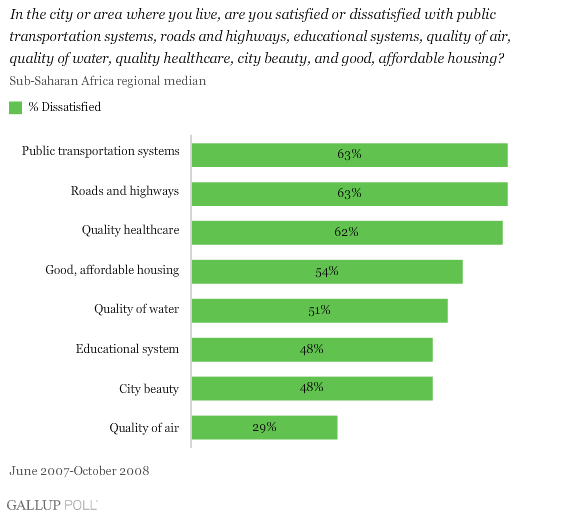
In West African countries, U.S. investment in roads and highways and public transportation, the two items with the highest median dissatisfaction scores of 79% and 77%, respectively, may perhaps represent the best opportunities for improvement, in addition to meeting local needs. However, the data suggest that an across-the-board approach may not always work, but rather that the United States should tailor aid initiatives at the country level first. For example, in Mauritania, citizens are more likely to be dissatisfied with the availability of quality healthcare (78%) than any other item mentioned on the survey.
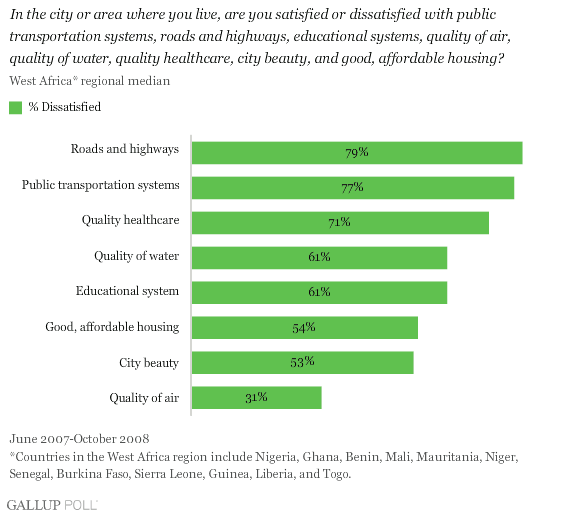
In the Central African region, roads/highways and public transportation again have the highest median dissatisfaction. However, in Chad, the availability of quality healthcare and affordable housing also top the list of infrastructure issues.
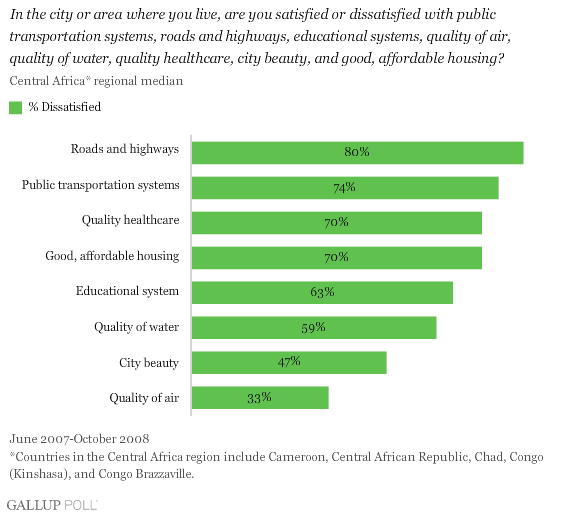
The picture in Eastern Africa is similar, but the frequency with which East Africans express dissatisfaction with roads/highways and public transportation is lower; those median dissatisfaction scores are 60% and 55%, respectively, on par with the scores for affordable housing (56%) and the availability of quality healthcare (54%).
Seventy-nine percent of Burundians and 73% of Ethiopians express dissatisfaction with public transportation, significantly higher than the regional median. Ethiopians are also significantly more dissatisfied with the availability of the quality of healthcare (83%) and affordable housing (72%) than East Africans overall.
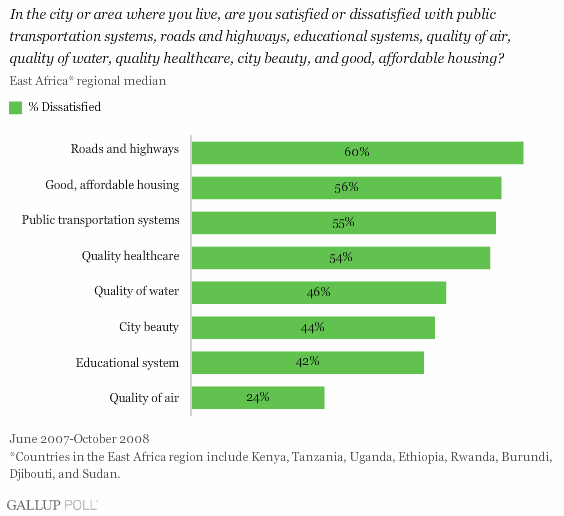
In Southern Africa, the regional median dissatisfaction scores for all items are slightly lower than those in East Africa. Affordable housing (47%), roads and highways (45%), the availability of quality healthcare (42%), and public transportation (41%) receive the highest median dissatisfaction scores.
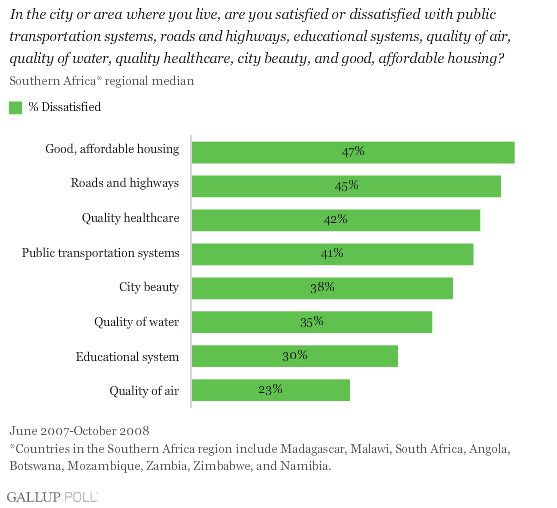
In Zimbabwe, which also presents political challenges, far higher percentages than in any other Southern African country express dissatisfaction with the education system, the availability of quality healthcare, and roads and highways.
Policy Implications: Data detailing the needs of sub-Saharan Africans, through their expression of dissatisfaction with several infrastructure areas, may help the Obama administration shape the practical implementation of its call for a bottom-up approach. Rather than focus exclusively on health issues, there is opportunity for the Obama administration to win support by improving some of the infrastructure issues with which Africans voice widespread dissatisfaction. Focusing on regional and country-level priorities may offer the United States the opportunity to continue to increase its approval ratings in the region, and even more importantly, improve the quality of life for millions in sub-Saharan Africa.
Survey Methods
Results are based face-to-face interviews with approximately 1,000 adults in each country, aged 15 and older, conducted June 2007-October 2008. For results based on the total sample of national adults, one can say with 95% confidence that the maximum margin of sampling error is ±5 percentage points. In addition to sampling error, question wording and practical difficulties in conducting surveys can introduce error or bias into the findings of public opinion polls.
